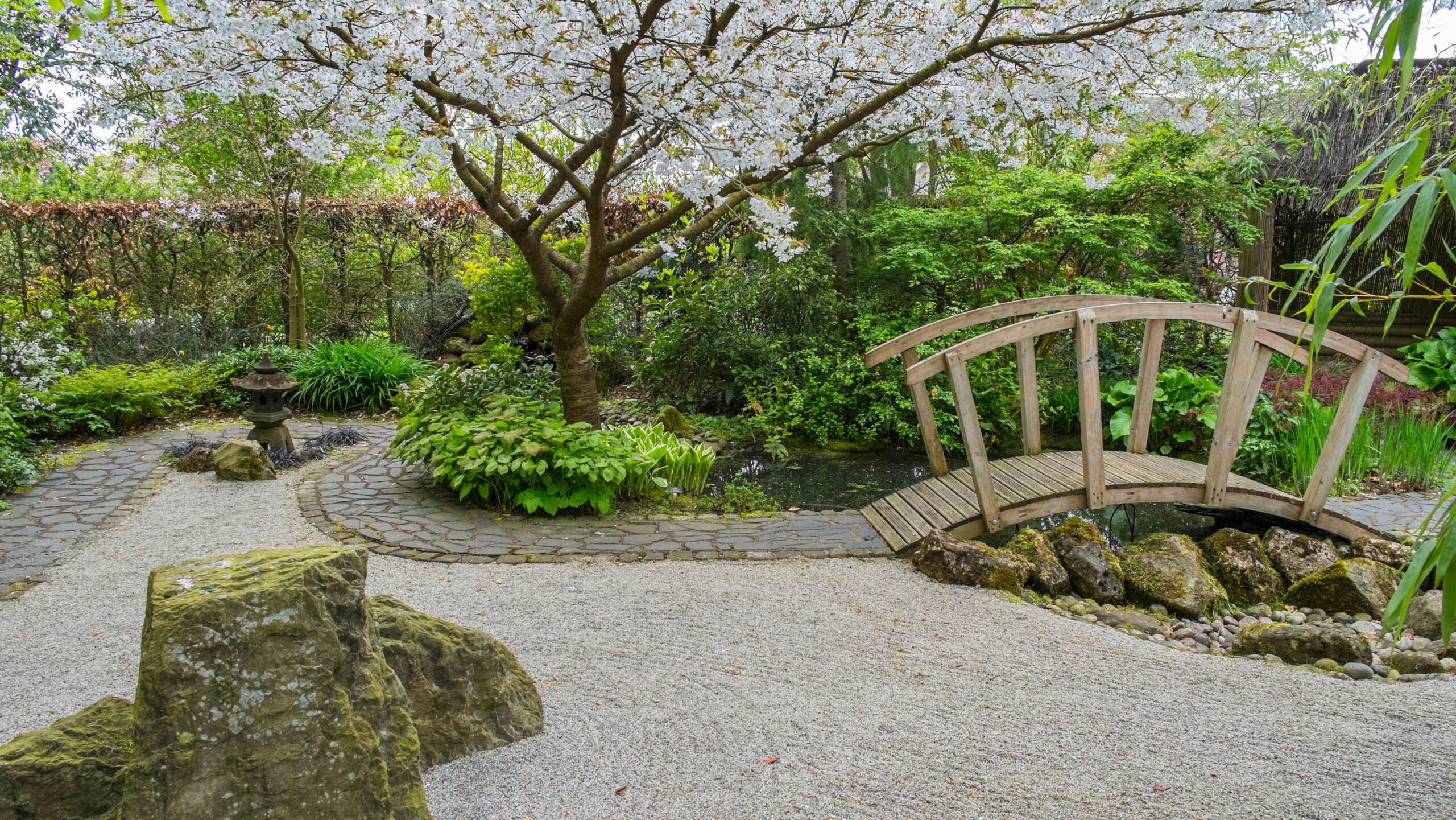Zen Garden Ideas: 11 Ways to Create a Calming, Japanese-Inspired Landscape in Your Backyard
Embracing the serenity of a Zen garden can transform your backyard into a retreat of tranquility and peace. Inspired by ancient Japanese tradition, these gardens are a testament to simplicity and minimalism.
Whether you have a spacious lawn or a modest balcony, the principles of Zen can be adapted to fit your outdoor space. Let’s explore how to create your own Zen sanctuary with these 11 soothing ideas.
What are Zen garden ideas?
A Zen garden, or Japanese rock garden, is an area designed to evoke the essence of nature and meditation. The primary elements include rocks, gravel, and sparse greenery, creating a minimalist landscape that encourages relaxation.
These gardens often incorporate raked gravel or sand to represent water, with larger rocks symbolizing islands or mountains. The careful arrangement of these elements is meant to promote peaceful contemplation.
Typical Zen garden ideas also involve using plants that are low maintenance yet add to the austere beauty of the space. The overall goal is to create a visually harmonious environment that also serves as a mental oasis.
Creating a Zen garden can be as simple as dedicating a corner of your yard to gravel and stone or as intricate as a fully landscaped space with bridges and water features.
How do you create a Zen garden in your backyard?
Designing a Zen garden requires an understanding of the principles of Zen and a touch of creativity. First, select a quiet spot in your backyard that feels naturally peaceful.
Begin by clearing the area of debris and planning your layout. Incorporate natural materials such as pebbles, rocks, and sand to create the base of your garden. Large stones can be placed to represent mountains, and raked gravel or sand can mimic the flow of water.

Keep the planting minimal—choose species like moss or small shrubs that enhance the contemplative nature of your garden. Remember to maintain a balance between the elements, as harmony is key in Zen philosophy.
Adding pathways or stepping stones can invite slow wandering, while a simple wooden bench provides a place for meditation and reflection.
What are the best plants for Zen gardens?
When selecting plants for your Zen garden, consider those that will complement the serene and minimalist vibe. Evergreens like junipers or pines provide year-round greenery without overwhelming the space.
- Mosses are an excellent ground cover and add a soft texture.
- Bamboo, although it can be invasive, brings a sense of calm with its gentle rustling.
- Maple trees, particularly Japanese maples, offer a delicate form and beautiful seasonal colors.
- Azaleas and rhododendrons can add a subtle floral touch without distracting from the simplicity.
Avoid overly bright or large flowers that can disrupt the meditative atmosphere. Instead, focus on subtle hues and textures that will blend harmoniously with the rocks and gravel.
How to maintain your Zen garden?
Maintenance is an integral part of the Zen garden experience, as it can be a meditative practice in itself. Regularly rake the gravel or sand to maintain the water-like patterns and keep weeds at bay.
Trim and prune your plants to preserve the neat and orderly appearance that is characteristic of Zen gardens. Also, clean any debris such as fallen leaves or branches to maintain the pristine nature of your space.
Periodically inspect and adjust the placement of rocks and other elements to ensure the balance and flow of the garden is intact. Remember, a Zen garden is a living space that evolves with time and care.
What are affordable Zen garden ideas for small spaces?
Creating a Zen garden doesn’t have to be expensive or require a lot of space. Even a small area can be transformed into a serene escape with some creativity.

- Use a tray or tabletop garden as a miniature Zen space, complete with sand, stones, and tiny plants.
- Opt for a corner of your patio or balcony and utilize potted plants, a small amount of gravel, and a few size-appropriate rocks.
- Recycle materials such as old bricks for pathways or large stones from construction sites for your garden’s main features.
- Shop at end-of-season sales for plants, or propagate your own to fill the garden.
- DIY elements like bamboo water spouts or rock sculptures can add personality without breaking the bank.
With these affordable options, even a compact balcony can exude the calmness of a traditional Zen garden.
 Flagstone patio ideas: 11 ways to enhance your backyard
Flagstone patio ideas: 11 ways to enhance your backyardHow do Japanese garden ideas differ from Zen gardens?
Japanese gardens and Zen gardens both originate from Japan but have distinct characteristics. While Zen gardens emphasize minimalism and are geared towards meditation, Japanese gardens are more diverse and focus on replicating natural landscapes.
Japanese gardens often feature a variety of plants, ponds, and streams, which create a sense of lushness and abundance. They may include koi ponds, ornate bridges, and intricate pathways, showcasing a richer palette of elements.
Zen gardens, on the other hand, use fewer plants and more stones, gravel, and sand, creating a stark yet soothing landscape. The primary goal of a Zen garden is to provide a space for quiet thought and introspection rather than replicating nature’s complexity.
Related Questions on Zen Garden Creation
What are Zen garden ideas?
Zen garden ideas revolve around creating a minimalist and contemplative space that utilizes natural elements such as stones, gravel, and plants. These gardens are designed to evoke a sense of peace and calmness.
Adding features like raked sand patterns, which symbolize ripples in water, and carefully placed rocks, which represent mountains or islands, are central to this design philosophy. The ideas may range from entire backyard landscapes to small indoor arrangements, all crafted with mindfulness at their core.
How do you create a Zen garden in your backyard?
To create a Zen garden, start by choosing a quiet area in your backyard and plan your layout carefully. Ensure that the space is free from clutter and distractions. Use sand or gravel as a base and add larger stones as focal points.
Next, introduce a limited number of plants that align with the Zen aesthetic, such as moss or small shrubs. Consider adding a water feature or a bench to enhance the meditative quality. Regular maintenance and attention to detail are crucial in sustaining the tranquil atmosphere of your Zen garden.

What are the best plants for Zen gardens?
The best plants for Zen gardens are those that promote a sense of calm and require minimal upkeep. Evergreens like junipers, mosses, bamboo, and Japanese maples are all excellent choices. They provide a variety of textures and subtle colors without dominating the space.
Avoid plants that might introduce chaos into the garden, such as high-maintenance species or those that grow too quickly and disturb the garden’s harmony. The plants should complement the Zen garden’s other elements, blending seamlessly into the overall design.
How to maintain your Zen garden?
Maintaining your Zen garden involves regular raking of sand or gravel, pruning of plants, and general upkeep to ensure that the garden remains a place of serenity. The maintenance itself should be considered a meditative practice, where one can engage in the repetitive tasks mindfully and with intention.
Paying attention to the cleanliness of the garden, the arrangement of the stones, and the health of the plants will keep your Zen garden in harmony with the intended aesthetic and purpose.
What are affordable Zen garden ideas for small spaces?
Affordable Zen garden ideas for small spaces include creating a mini Zen garden on a balcony or patio using potted plants, small stones, and a bit of gravel. Utilize vertical space by hanging plants or creating a vertical garden wall.
DIY projects can add a personal touch and save money, such as handmade stone paths or bamboo water features. Simplify your design to include only the most essential elements, which can also reduce costs while still capturing the essence of a Zen garden.
How do Japanese garden ideas differ from Zen gardens?
Japanese garden ideas incorporate a wider variety of elements, such as ponds, streams, and diverse plant life, to create a miniature representation of nature. They often invite exploration and enjoyment of the scenery.
In contrast, Zen gardens are much more austere, focusing on simplicity and space for meditation. The differences lie in the intent and level of complexity, with Japanese gardens being more decorative and Zen gardens being more philosophical and introspective.

As we delve into the calming world of Zen gardens, this insightful video showcases how to create a beautiful Japanese-inspired landscape, offering practical tips and visual inspiration for your next outdoor project.
Incorporate these Zen garden ideas: 11 ways to create a calming, Japanese-inspired landscape in your backyard, and you’ll soon enjoy the tranquility and aesthetic simplicity that these spaces provide. Whether you’re looking for an affordable Zen garden idea for small spaces, ways to maintain your garden, or distinctive plants to enhance the Zen feel, the journey to creating a peaceful backyard retreat is a rewarding process that promotes mindfulness and connection with nature.
 Budget above ground pool ideas: 8 affordable designs for your backyard
Budget above ground pool ideas: 8 affordable designs for your backyard
